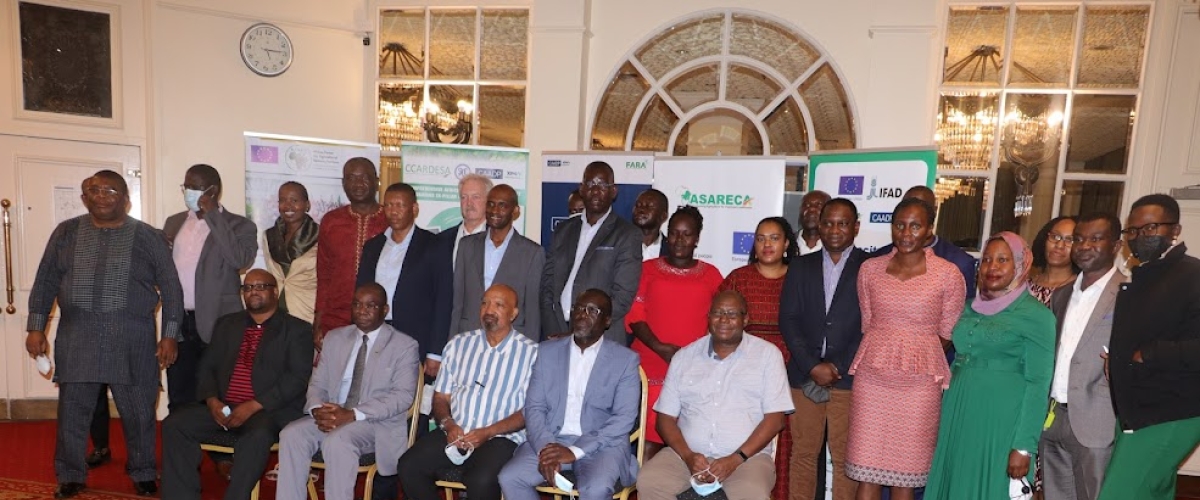
The Centre for Coordination of Agricultural Research and Development in Southern Africa (CCARDESA) attended a Comprehensive Africa Agriculture Development Programme’s ex-Pillar 4 (CAADP-XP4) hybrid Portfolio Review Meeting in Nairobi, Kenya. The CAADP-XP4 Programme is funded by the European Union (EU) and administered by the International Fund for Agricultural Development (IFAD). It is implemented in collaboration with the African Forum for Agricultural Advisory Services (AFAAS), Association for Strengthening Agricultural Research in East and Central Africa (ASARECA), West and Central African Council for Agricultural Research and Development (CORAF) and Forum for Agricultural Research in Africa (FARA).
The purpose of the meeting was to assess CAADP-XP4 project implementation progress, take stock of lessons learnt, jointly plan for implementation of the project and deepen collaboration in 2022 with strategic guidance from the Technical Committee (TC) and the Advisory Committee (AC). The meeting was hosted by AFAAS, one of the CAADPXP4 consortium institutions.
The meeting was officially opened by the CAADP-XP4 Task Team Leader, Dr Malu Ndavi from IFAD. He urged the Technical Committee members to develop concise consortium achievements in line with the approved consolidated targets/milestones in the CAADP-XP4 result framework. He reminded the Technical Committee (TC) members of their role to strengthen the capacity of the consortium to deliver on the CAADP-XP4 programme mandate.
CCARDESA’s CAADP-XP4 Dr Baitsi Podisi shared the progress, achievements that CCARDESA made during the reporting period. He highlighted that CCARDESA achieved more despite the implementation challenges encountered due to the COVID-19 Pandemic.
During a session where the Technical Committee (TC) had presented program progress to the Advisory Committee (AC), the CCARDESA Executive Director, Dr Cliff Dlamini, reiterated the importance of working closely with national stakeholders to strengthen collaboration and resource mobilization as well as to build the trust amongst the consortium members.
The CAADP-XP4 Consortium places great importance to resource mobilisation as it fosters programmes continuity. Therefore, in one session, a resource mobilisation consultant Dr. David Nielson shared strategic ways the institutions can improve their chances of accessing funding. Dr Nielson shared with the meeting the strategic initiatives that he has planned for the 5 organizations. He explained how the organizations will develop joint plans and proposals for resource mobilization. Dr Nielson also demonstrated how the organizations could engage the development partners and other financiers. He further elaborated how the consortium members could through round tables, CAADP-XP4 meetings and other high-level meetings engage with various donors.
The meeting discussed joint implementation of activities across the technical thematic areas to maximize reach in the different parts of Africa where the consortium members are strategically stationed. The joint activities will also demonstrate oneness and further strengthen the collaboration within the consortium. The meeting resolved to facilitate a midterm review around April-May where the Programme progress will be reviewed to inform the next steps.
This meeting was attended by technical and support staff from the 5 institutions alongside their Executive Directors who held parallel meeting sessions to engage on strategic issues related to the programme and the broader AR4D issues. CCARDESA was represented by the CCARDESA executive Director, Dr. Cliff Dlamini, Dr Baitsi Podisi (CAADP-XP4 Programme Coordinator), Futhi Magagula (CAADP-XP4 Programme Officer), Bridget Kakuwa (CAADP-XP4 ICKM Officer) and Lerang Lephole (CAADP-XP4 Assistant Finance Officer).
CCARDESA is implementing the CAADP-XP4 Programme in 7 SADC countries (Botswana, Eswatini, Mozambique, Namibia, Tanzania, Zambia and Zimbabwe) from 2019 to 2023. The CAADP-XP4 Programme intends to boost the agricultural transformation agenda through innovations in agriculture and food systems in partner countries which will make them resilient to climate change and to better respond to the development demands.






